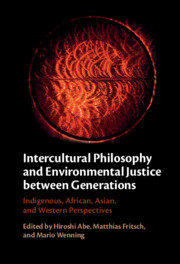 Intercultural Philosophy and Environmental Justice between Generations
Intercultural Philosophy and Environmental Justice between Generations from Part I - Indigenous Philosophies on Justice between Generations
Published online by Cambridge University Press: 14 March 2024
In this chapter, I will examine how Africans envision their futures and promote intergenerational justice. In African worldviews, a community is comprised of three generations: the living dead, the living, and the yet-to-be-born. The three generations are interconnected. The current generation should owe a debt of gratitude to its forbears for leaving a usable environment behind and fulfilling its moral obligation towards future generations. In the African worldview, successive generations share the environment (the land). According to African intergenerational ethics, natural resources ought not to be exploited beyond their limit, and the land ought to be taken care of for the benefit of present and future human generations, as well as for the good of non-human species. The Oromo of Ethiopia and other cultural groups in Africa do not simply consider justice, integrity, and respect as human virtues applicable to human beings, but they extend them to non-human species and Mother Earth. Thus, I argue that intergenerational thinking can help humanity to address both local and global environmental problems.
To save this book to your Kindle, first ensure [email protected] is added to your Approved Personal Document E-mail List under your Personal Document Settings on the Manage Your Content and Devices page of your Amazon account. Then enter the ‘name’ part of your Kindle email address below. Find out more about saving to your Kindle.
Note you can select to save to either the @free.kindle.com or @kindle.com variations. ‘@free.kindle.com’ emails are free but can only be saved to your device when it is connected to wi-fi. ‘@kindle.com’ emails can be delivered even when you are not connected to wi-fi, but note that service fees apply.
Find out more about the Kindle Personal Document Service.
To save content items to your account, please confirm that you agree to abide by our usage policies. If this is the first time you use this feature, you will be asked to authorise Cambridge Core to connect with your account. Find out more about saving content to Dropbox.
To save content items to your account, please confirm that you agree to abide by our usage policies. If this is the first time you use this feature, you will be asked to authorise Cambridge Core to connect with your account. Find out more about saving content to Google Drive.